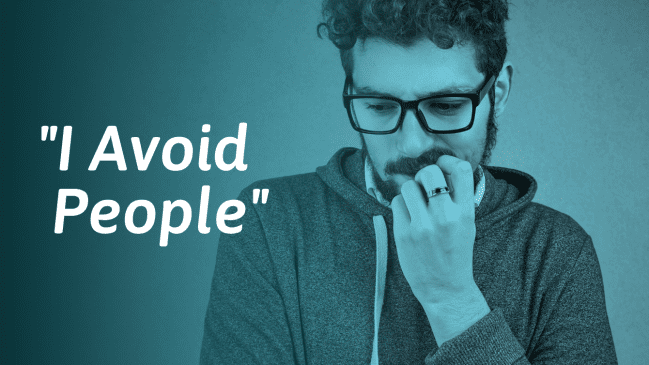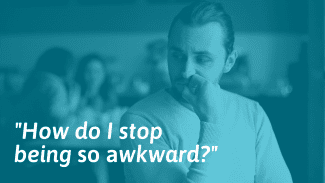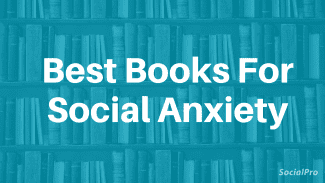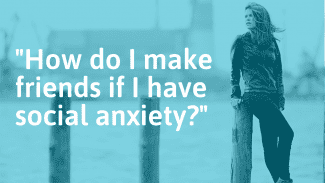This article is for you who instinctively hide when you see someone you know in public. Perhaps you feel lonely but you hate being around people. Or, you might feel like you can’t initiate a conversation because you’re worried about rejection, and as a result, you avoid people.
Why do I avoid people?
You might avoid people that you know because you prefer your own company, you don’t know how to make small talk, or you’re scared of feeling vulnerable or exposed around others. Some people are also restricted by mood disorders, shyness, or previous negative experiences.
Why do I avoid people that I know?
You might avoid people you know because you’re uncertain what’s expected of you and that it might get awkward. You might not know at what stage you are in your friendship, or what to say to them. You might also feel like you’ll have to be energetic and friendly when you don’t want to.
This guide will tackle the reasons why you might feel uncomfortable around other people, as well as how to overcome your social awkwardness.
For more advice, see our article on what to do if you don’t like being around people.
Here are several common reasons for avoiding people:
1. Social anxiety
I used to worry that others were judging me, and this resulted in me avoiding people because they made me feel nervous, tense, and uncomfortable.
Social anxiety causes distorted beliefs when judging your relationships with others, and I ended up having illogical thoughts such as:
“I’m not interesting enough to maintain a conversation.”
“People must think I’m an idiot when I speak.”
“I’m not important – why would anyone want to talk to me?”
As a result of these thoughts, I sometimes behaved in a way that I hoped would reduce my anxiety, and I stayed away from other people. Unfortunately, avoidance only made my worries worse, as I couldn’t avoid social contact forever.
Here are some things that I did to get my social anxiety under control:
Remember that anticipation is worse than reality
Our worries about an upcoming social event are often worse than the actual event itself.
I tried to mentally prepare myself in advance by anticipating my more frequent anxious thoughts and writing them down. Then I challenged these thoughts by examining the evidence to the contrary.
For example, you might think something along the lines of:
Thought: “I’m not interesting enough to maintain a conversation with someone.”
Think back to a time when you were able to hold a successful conversation. Was it at work? When you were in school? It doesn’t matter how long ago – it’s still proof that you are able to do it. Thus, your challenging thought may sound something like this;
Challenge: “I have successfully carried conversations in the past. I know I can do it again.”
When reintegrating myself socially, I carried my “cheat sheet” of negative thoughts and challenges around with me to remind myself of my past successes when I needed to.
Seek out help
If your social anxiety feels out of control, then it might be time to consider looking for help. Cognitive Behavioural Therapy (CBT) is the most widely recognized therapy for the treatment of anxiety. It focuses on the present to provide you with the tools you need to make progress towards your social goals.
We recommend BetterHelp for online therapy, since they offer unlimited messaging and a weekly session, and are cheaper than going to a therapist's office.
Their plans start at $64 per week. If you use this link, you get 20% off your first month at BetterHelp + a $50 coupon valid for any SocialSelf course: Click here to learn more about BetterHelp.
(To receive your $50 SocialSelf coupon, sign up with our link. Then, email BetterHelp’s order confirmation to us to receive your personal code. You can use this code for any of our courses.)
2. Low self-esteem
You might avoid other people if you have low self-esteem, as you may have fragile self-confidence and be highly sensitive to the opinions of others.
What’s more, people with low self-esteem often compare themselves unfavorably against others and the influence of social media platforms such as Instagram means that we’re more likely to evaluate ourselves based on other people’s picture-perfect moments instead of their more tarnished realities.
Instead of worrying about how you measure up against everyone else, think about what matters to you, such as your dreams and goals, and take actions that are more likely to help you reach them. You’ll notice your confidence increasing as you achieve personal growth.
See our recommendations on the best books on how to improve your self-esteem.
3. Introversion
“As an introvert, I hate being around people”
If you’re introverted, you may feel like you dislike people but the truth might be closer to not liking being around lots of people.
Introverts typically prefer to spend quality time with close friends rather than being around large groups, as they can drain their energy reserves and leave them feeling exhausted.
However, just because your idea of a good time is a quiet night in enjoying your interests and hobbies, this probably doesn’t mean that you want to be alone all the time – you might just need to reflect and recharge after being social.
If you’re introverted but want to be more outgoing, it’s important to expand your social comfort zone slowly – try not to throw yourself in at the deep end too quickly, or else you might experience burn-out.
Think about what it is about socializing that drains you; oftentimes it’s not actually talking and listening to others that introverts find exhausting, but the lack of conversations that they find stimulating.
The trick is to navigate a conversation onto a topic that you naturally find more energizing. But the question is how?
Try asking a question that taps into the other person’s unique experience of the world rather than focusing on the details of an activity or event. This might sound like:
- “That class sounds really interesting. What made you want to get involved?”
- “What is it about this type of music that interests you?”
- “What is it about volunteering that’s important to you?”
You’ll quickly find that your conversations with others will become more engaging and stimulating – you might even discover that you have something in common with the other person, which could potentially lead to a rewarding friendship.
Also, it’s important to remember that your needs as an introvert are just as valid as those of socially savvy people; solitude is as nourishing as food and water to an introvert – it boosts your mood and energy and recharges you for more social interaction. So if you find that you’re experiencing social burnout after an event, then you may need to spend some time alone in a quiet and calm space.
See our guide on how to be more extroverted when you want to.
4. Avoiding someone you’re attracted to
It’s totally normal to avoid someone that you have a crush on.
Heightened emotions, as well as anxiety and nervousness, can cause you to think things like:
“I’m definitely going to mess up and say something stupid around them.”
“They’re so out of my league.”
“What if they figure out that I like them? I’d be so embarrassed.”
However, if you completely avoid the person that you’re attracted to, then you can’t be sure that your feelings aren’t reciprocated. After all, as Wayne Gretzky said; “You miss one hundred percent of the shots you don’t take.”
Try to see your crush realistically; remind yourself that they are far from perfect by thinking back to a time when they did something wrong. Did they embarrass themselves in some way? Or did they get a fact incorrect or do a bad job at something?
Doing so can help you see them as more human. This can help to reduce your nerves and make it easier to be around them.
Also, talking out your feelings with someone that you trust such as a friend or family member can allow you to process them and enable your mind and body to relax a little.
This can help you be around your crush without feeling totally overwhelmed by nerves.
5. Depression
Depression varies from person to person, but social withdrawal is one of the more common tell-tale signs.[2]
Depression can make you not want to leave the house, avoid people that you know or are friendly with, and give you anxiety around people. Essentially, depression can turn you into a hermit.
Furthermore, it’s tough to maintain friendships when you’re depressed – you might feel like you don’t have the energy or the initiative to reach out to others, or you might feel like you’re not good company because of your depression.
However, socializing with people you like can improve your mood, so it’s important not to withdraw from life entirely.[3]
Try to be mindful that some social engagements will feel a little more doable for you than others. For example, seeing one or two people at a time for a quiet movie night will feel more manageable than dealing with a noisy room full of people at a party.
If leaving the house feels like too much, then keep in touch with family and friends through phone calls, text messages, or Zoom calls; we derive meaning from our relationships, so connecting with someone that you value will help you to feel less alone in your depression.
See our previous guide on how to make friends when you’re depressed.
6. Toxic friendships
Friends help us to stay physically and mentally strong; they scaffold us when we’re stressed, guide us towards making better lifestyle choices, aid us when we’re rebounding from illness, and improve our overall quality of life.
However, not all friendships are positive. In fact, some may even have a toxic impact on your well-being. This can cause you to avoid people that you know, as it’s a common reaction to withdraw from someone who hurts your feelings.
Everyone has their ups and downs, so it’s important to recognize the difference between when you’re being overly sensitive to someone’s actions and opinions, and when your friendship is potentially causing you more harm than happiness.
Think about how they act around you and how they make you feel about yourself.
Do they constantly put you down? Or do they use undermining tactics and generally make you feel anxious and miserable all the time? If so, then it’s likely that your friendship isn’t having a positive impact on your life.
This guide from Helpline will help you to identify a toxic friendship.
7. Fear of rejection
“I avoid people so I won’t get hurt.”
If you experience thoughts such as this, then you might have a fear of rejection.
Whether it happened with friends, at work, or through dating, the pain that we experience after being rejected is similar to physical pain – it even activates the same areas of the brain.[1]
This is why the fear of rejection can become crippling – your dread of being hurt again prevents you from putting yourself out there, and it can hold you back from all that life can offer, like romantic relationships, friendships, and career goals.
The following actions can help you to manage your fear of rejection:
Expose yourself to your fear
Putting yourself out there might be scary, but it will also give you the opportunity to achieve your goals.
For example, if you fear being rejected romantically, you could try setting up an online dating profile on a site such as Tinder but not intend to use it just yet. In time, when you feel comfortable enough, you could initiate a chat with someone, and eventually even set up a date.
Rebuild your self-worth
Rejection can damage your self-confidence, especially if you allow yourself to obsess over the reasons why. It’s important to remember that there was probably a logical reason for the rejection; perhaps there was a mismatch of personalities or skills. Either way, it likely wasn’t personal.
To rebuild your self-worth, try making a list of five things that you like about yourself, or else remind yourself of past successes in the area in which you were rejected. This might look something like this:
1. “My input has always been valued at work/by friends.”
2. “My actions have contributed to the success of my workplace.”
3. “I am resilient and kept going even when circumstances were tough.”
4. “My colleagues/friends always show me how much they respect me.”
5. “I have achieved personal goals that I set for myself.”
Reminding yourself of things that you have achieved can go a long way towards putting yourself out there again in the future.
8. Avoiding colleagues
Whether you don’t view the workplace as a place to make friends, or you feel uncomfortable around your coworkers, not socializing at work can create tension as people might think that you don’t like them.
However, making the effort to establish a level of friendliness with your colleagues can reduce stress levels, increase your productivity, and strengthen the connections within your team.
You spend most of your day in the office with your coworkers, so try to take the time out of your busy schedule to socialize with them.
Suggest a coffee break and try not to discuss work, don’t immediately rush back to your desk after you’ve eaten lunch, and attend in-house events such as birthdays or office celebrations.
Break down barriers to communication by asking your colleagues icebreaker questions about themselves, this might sound like:
- “I saw a picture of your daughter on your desk. What grade is she in?”
- “Did you do anything nice over the weekend?”
- “I’m thinking of taking my mom to a restaurant this weekend – have you been anywhere good recently?”
Hanging out with coworkers outside of the office also has its perks.
It will help you to gain insight into their true personalities and interests, which can lead to genuine friendships. This doesn’t mean that you have to spend every weekend with the people that you work with, but it does mean saying “yes” to the odd invitation to go for an after-work drink or a slice of pizza.









I don’t understand social anxiety suggest do not worry about what others think about you. On the other hand, I should worry about my co-worker feelings I don’t like them if I don’t engage in conversations with them. How about to accept and respect everyone’s decision to be alone?
This was really good. It can be hard to believe in people when being hurt but this article gives me hope. Don’t have to talk to everyone but avoiding can be dangerous too. I tend to avoid those who I’m closest to the most I don’t like letting them in.
Same.
Society in general and individuals specifically never fail to disappoint no matter how open my mind is.
I’m going to be a happy hermit for the rest of my life.
Avoid contact to avoid contracting airborne illnesses … Avoid contact with 98% of people to avoid their dramatic lifestyles. Trust no one because the moment your guards are down ,they will take advantage of you because people effin suck .
Yeow! All people can’t possibly suck, just the “wrong” ones. Predators. Narcissists. The ones with agendas, with approval lists, whose sole relationship goal is for their needs to be met. Parasites who try to “sell” themselves to you & everyone else. If anyone talks to/about you like an object, run the other way. Learn the art of listening to your gut, and expect the best for yourself. The sooner you let go of the past, the better you’ll feel.
It’s not easy when you don’t have 5 things you like about yourself.
I don’t have friends, who might value me or my input. I also work alone, in a small office. Co workers only make contact for business questions.
My work dose not have, or I do not get invited to, in-house events.
All inall, it’s easier to remain a hermit, even though I don’t really want to
Yeah i know i feel like that too. Right now i feel like im going through all the things written in this articles maybe except toxic friendships cause i dint have any friends, but i feel like the people in my family have toxic behaviour sometimes. I think that if we do tiny steps in this direction eventually we ll be able to do it
Similar situation here. I have resigned myself to the fact that I will live out the remainder of my years alone, and I do my best to enjoy my solitude, but it is so difficult sometimes. I wish you well.